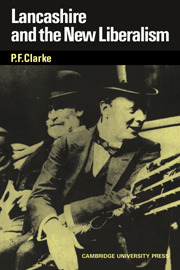Book contents
- Frontmatter
- Contents
- Preface
- Abbreviations
- Dedication
- PART ONE INTRODUCTION
- PART TWO FORMATIVE INFLUENCES
- PART THREE THE TERMS OF THE CONTEST
- PART FOUR THE RECONSTITUTION OF LIBERAL LANCASHIRE
- PART FIVE FIELDS OF RECRUITMENT
- PART SIX GOING TO THE COUNTRY
- PART SEVEN CONCLUSION
- APPENDICES
- A Voting in the north west
- B The franchise
- C Strength of the Irish vote
- D Support given to Liberals or Conservatives by leading Unionist Free Traders (mainly from Manchester) in general elections, and in two by-elections in Manchester North West
- E Analysis of the poll in 2-member boroughs, 1900–10
- F Max Aitken and the Ashton Trades Council, December 1910
- Bibliography
- Index
F - Max Aitken and the Ashton Trades Council, December 1910
Published online by Cambridge University Press: 23 November 2009
- Frontmatter
- Contents
- Preface
- Abbreviations
- Dedication
- PART ONE INTRODUCTION
- PART TWO FORMATIVE INFLUENCES
- PART THREE THE TERMS OF THE CONTEST
- PART FOUR THE RECONSTITUTION OF LIBERAL LANCASHIRE
- PART FIVE FIELDS OF RECRUITMENT
- PART SIX GOING TO THE COUNTRY
- PART SEVEN CONCLUSION
- APPENDICES
- A Voting in the north west
- B The franchise
- C Strength of the Irish vote
- D Support given to Liberals or Conservatives by leading Unionist Free Traders (mainly from Manchester) in general elections, and in two by-elections in Manchester North West
- E Analysis of the poll in 2-member boroughs, 1900–10
- F Max Aitken and the Ashton Trades Council, December 1910
- Bibliography
- Index
Summary
A. H. Scott certainly had a long and creditable record as a Manchester Progressive, working closely with Labour. Moreover, as M.P. for Ashton he had several times voted against the Government on Labour questions, notably on the Right-to-Work Bill. ‘The Labour Party’, claimed one of his trade union supporters, ‘had regarded Mr. Scott as practically “one of their own”.’ In the election the Trades Council had appointed a deputation of three to question the candidates and report back to it. It consisted of H. Cocker, its Vice-President, and the secretaries of the local Weavers and Spinners, S. T. Goggins and Edward Judson. It met the candidates on the Wednesday before the Saturday of polling and seems to have discussed three matters. While Scott declared himself in favour of the Right-to-Work Bill and the Minority Report of the Poor Law, Aitken merely asked for more time to consider them; but on the Osborne Judgement Scott made it clear that although he supported the Labour party Bill he would welcome provision for contracting out, while the untutored Aitken promised to support it sans phrase. Cocker later apparently held Aitken up to ridicule, saying: ‘Yon fellow will promise to vote for anything, but he doesn't understand what he's promising. He asked us not to be too hard on him, as he'd “only been in politics a week”!’
- Type
- Chapter
- Information
- Lancashire and the New Liberalism , pp. 437 - 438Publisher: Cambridge University PressPrint publication year: 1971



